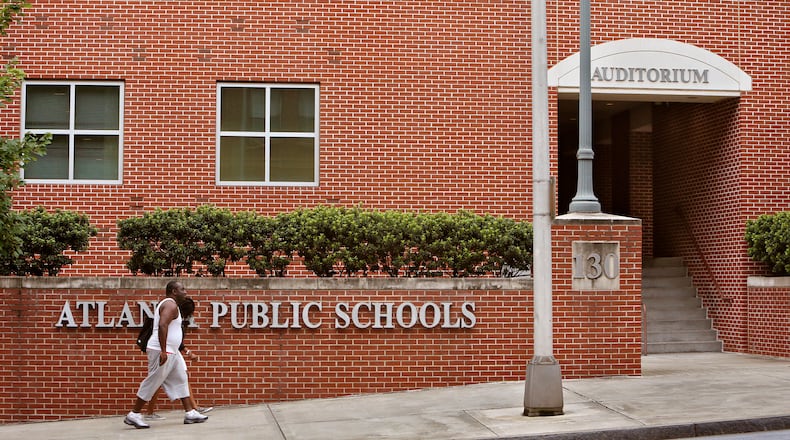Atlanta Public Schools officials must step in with major interventions if struggling schools fail to improve for three years, according to a proposal under review by the board.
The board gave preliminary approval earlier this month to a set of “goals and guardrails” intended to provide accountability as the district tries to boost under-performing schools.
The document, expected to be finalized in the fall after more public input, has stirred division.
Some are calling for sharper language to force what they say is needed change in failing schools. Others say it’s unrealistic and unfair to overhaul a school if it doesn’t turn around in just a few years. “High-impact” interventions suggested, but not mandated, by the board include merging schools, replacing staff, or outsourcing to a charter operator.
“I want to make sure that we give every child and every school everything that they need to be successful and that we don’t use these goals and guardrails as an excuse for taking drastic action without having first done everything we can to support kids and schools,” said board member Cynthia Briscoe Brown.
Advocates pushing for APS to fix failing schools are demanding tight timelines for improvement, metrics to gauge success and strategies to replicate what works and cut out what doesn’t.
“How can you have true equity without true accountability?” said Ricardo Miguel Martinez, a leader of Latino Association for Parents of Public Schools. “We’ve allowed no accountability for this long, and we’ve had schools that are failing for generations.”
The sticking points — how soon the district should step in and what remedies should be on the table — are some of the same ones that stalled school improvement discussions in 2019. Back then, the board stopped short of approving a rating system to measure each school’s performance.
Board member Michelle Olympiadis opposes a three-year time limit for struggling schools.
She noted that the standard APS charter school contract is for five years. And others have been given even longer to achieve gains. In 2016, as part of a turnaround strategy, APS signed a contract with Purpose Built Schools to take over four troubled schools. That pact lasts 14 years.
“I do believe different schools in different communities are going to need much more time to really reevaluate their situation,” Olympiadis said at a recent board meeting.
Others worry that if principals are pressured to produce results too quickly it could lead to unintended consequences.
”If this remains you all are setting this district up for another cheating scandal because no one can turn around a school in three years,” said Valerie Williams, president of the Atlanta Alumni Association of Booker T. Washington High School, at the same meeting.
Olympiadis lobbied successfully to add a requirement that the district conduct a “comprehensive needs assessment” to determine the root cause of a school’s problems as an early step.
She thinks it should be left to the superintendent, not the board, to come up with potential interventions. Those could include a wider variety of solutions, such as changing the reading curriculum or addressing student attendance.
Board chairman Jason Esteves said many parents want more accountability from APS. He said the board needs to specify how much time schools have to improve and to explain the kind of major remedies the superintendent can use.
“I didn’t want the timing to be left open to interpretation, and I certainly didn’t want what ‘high impact’ meant to be open to interpretation,” he said.
The board defines struggling schools as those where “there has not been growth” or where academic gaps between students have not sufficiently closed.
In recent years, the district’s turnaround efforts have seen mixed results.
Only 37% of APS students in third through eighth grade scored at proficient levels in reading on the 2019 Georgia Milestones tests. In math, it was 35%.
The board wants to increase those scores by about 10 percentage points by 2025, according to a draft of the goals.
About the Author
Keep Reading
The Latest
Featured



